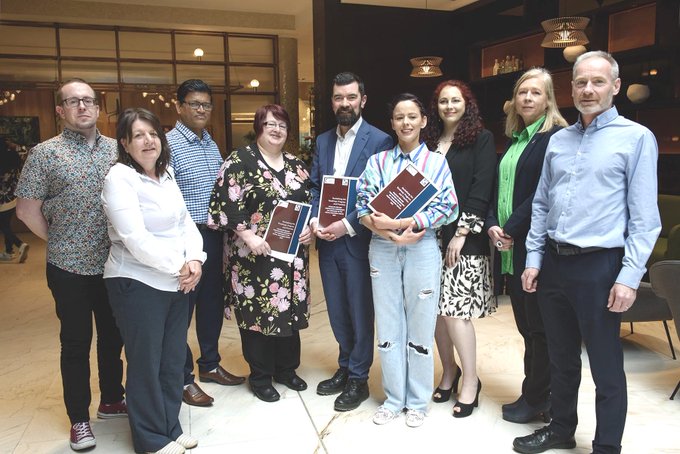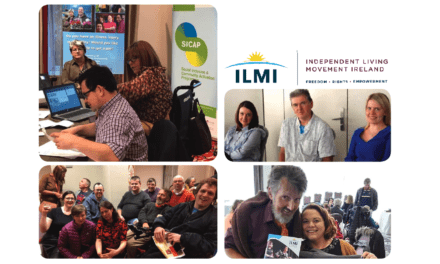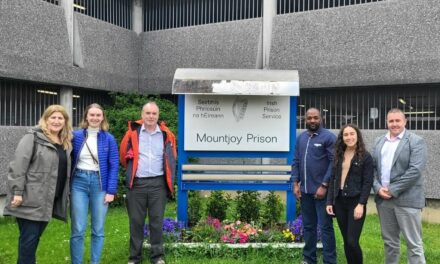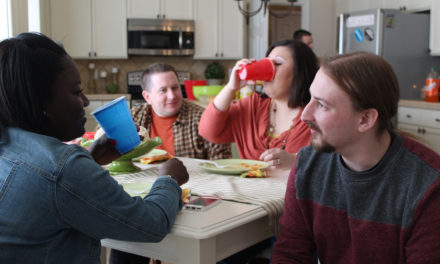A zero-tolerance approach to child poverty, a travel allowance to replace the travel pass, and employment quotas for marginalised communities were some of the suggestions that emerged from yesterday’s Social Inclusion Forum in Dublin.
CWI and EAPN Ireland reported that the key issues participants wanted heard at the Social Inclusion Forum (SIF) “are not new and are not unknown”.
“They have been stated and repeated in one guise or another at many of the SIFs and in other policy spaces.”
Nonetheless, Minister of State Joe O’Brien said that “really important conversations” take place at SIF.
“This event is crucial,” he said. “It allows us as politicians and the relevant officials to listen to the lived experiences of people and hear how policy directly impacts lives.”
He said it will help inform the government’s next budget.
The SIF is part of the Government’s structures to monitor and evaluate the State’s strategy to address poverty and achieve social inclusion for all.
Launched in 2020, The Roadmap to Social Inclusion 2020 – 2025 is the current national strategy, and the theme of Social Inclusion Forum 2023 was Revitalising the Roadmap: Progress and Priorities.
In advance of the Forum, Community Work Ireland (CWI) and the European Anti-Poverty Network (EAPN) Ireland hosted a series of workshops to identify issues of concern to people affected by poverty and the organisations working with them.
The workshops reflected the four themes of Social Inclusion Forum 2023: core essentials – the cost of living and income adequacy; social inclusion and children; social inclusion and older people; and expanding opportunities for employment.

– Paul Ginnell, of the European Anti-Poverty Network (EAPN) Ireland addressing the Social Inclusion Forum
CWI and EAPN Ireland reported that the key issues participants wanted heard at the Social Inclusion Forum “are not new and are not unknown”.
“They have been stated and repeated in one guise or another at many of the SIFs and in other policy spaces.”
Nonetheless, Minister of State Joe O’Brien said that “really important conversations” take place at SIF.
“This event is crucial,” he said. “It allows us as politicians and the relevant officials to listen to the lived experiences of people and hear how policy directly impacts lives.”
He said it will help inform the government’s next budget.
Addressing the Forum, Paul Ginnell of the EAPN noted that emergency measures can be effective in the short term in tackling poverty, but in the long term, specific interventions are required. He also said that people on the ground stress that “there should be zero tolerance of child poverty”.
A report on the key messages for the Forum that were gathered during the workshops stated: “There should be a zero-tolerance policy for children and young people in poverty. There are significant, long-term impacts on the life chances of people that experience poverty and social exclusion as children. Addressing child poverty requires a whole of Government approach, with a focus beyond the immediate need in order to ensure long-term, sustainable goals.”
CWI and EAPN Ireland reported, “The legacy of Covid-19, current international events and unprecedented inflation have deepened the poverty and social exclusion experienced by many people and communities to levels that will be difficult to address without immediate, consistent intervention by the State.”
Addressing the Forum, Athlone-based community development worker Jeyald Antony suggested: “The recognition of qualifications for migrant workers needs to be drastically improved to avoid displacing talents and expertise.” He also called for recruitment quotas for people from marginalised communities.
Maura, another Forum attendee, pointed out that “while Ireland in economic terms is at full employment, many still can’t access work”.
Carol Baumann, CEO of the Irish Local Development Network offered some suggestions from the workshop on better opportunities for employment. She said jobs must be sustainable, and well paid. She also noted that transport issues posed a major barrier to employment, particular for people with disabilities.
Access to transport was described as ‘critical’ in terms of the Roadmap to Social Inclusion’s goal of expanding opportunities for employment.
Workshop participants reported that transport was “often inaccessible and expensive, making work pay more difficult”.
“The free travel pass is a joke,” remarked Ann Irwin of Community Work Ireland, reflecting the views of community representatives consulted in the pre-forum workshops.
During the workshops, another participant said of the free travel pass: “There is no transport to access. An allowance should be paid in lieu of the pass to those that live in rural areas and where there is no public transport.”
Tracey Noone, network development officer with Irish Rural Link attended the inclusion and older people workshop. She issued three recommendations to the Forum: Restore the spending power of the State pension to pre-2020 levels; remove barriers to digital exclusion; appoint a Commissioner for Older People to oversee policy, which should have a whole of Government approach.
On the theme of cost of living and income adequacy, one workshop participant spoke of being “appalled at the standard of accommodation” while carrying their Census enumerator role.
Another warned: “People are forced to choose between eating and heating – it is much worse than we actually thought, way beyond what we could even imagine.”
Minister Heather Humphreys opened the day’s proceedings, saying the forum was “an important event in the government’s diary” because it “allows for constructive engagement between government departments, people experiencing poverty and social exclusion, and the community and voluntary sector groups representing them.”
Commenting on the findings of the mid-term review, Minister Humphreys said:
“I welcome the commitment towards the delivery of the Roadmap ambitions and goals across Government, which is highlighted by the addition of new commitments assigned to nine departments, including my own. Government remains fully committed to the implementation of the Roadmap and the mid-term review will be used to realise its goals.”
Minister of State Joe O’Brien, said, after hearing about issues such as an overreliance on food banks, and a shortage of community workers: “I’m picking up on feelings of urgency, frustration, but also solidarity.”
The forum and research conducted in advance (all available for download from the Department of Social Protection’s website) examined homelessness, food poverty, fuel poverty, digital poverty, and access to healthcare as other challenges faced by households with inadequate incomes.
The report added: “Short term measures, such as the energy subsidies provided by the Government, are needed, but they are not sufficient to address the issues in the long term. More proactive approaches and whole of Government work is needed to effectively address the underlying and root causes of poverty and social exclusion. It was also felt that Government should put more efforts into targeting supports. Regulation of energy prices is urgently required, and schemes to retrofit houses needs to be fast-tracked.”
Separate to the main mid-term report you can also download the Department’s December 2022 Report on Stakeholder Consultation which was conducted as part of the overall review at:
For yet more, see here.










